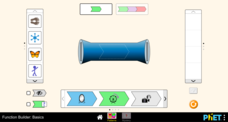Constitutional Rights Foundation
Conservation, Preservation, and the National Parks
Going green? Scholars investigate the creation of the US National Park program. Through diary entries as well as expert testimony, they synthesize information and analyze the need for conservation and preservation. Finally, they display...
Annenberg Foundation
Evaluating Evidence
Was the Civil War fought only due to slavery? Using an interactive web tool, scholars investigate the four main causes of the Civil War. Gathering evidence and data to support their claims, they present a final statistical breakdown...
NET Foundation for Television
1850-1874 Native Americans and Settlers
Did Western settlers receiving free land from the Homestead Act realize it wasn't really free at all? Scholars investigate the impact Western expansion had on Native American culture in the mid-1800s. They use documents, timelines, and...
NET Foundation for Television
1850-1874 Beef Moves to Nebraska
Just how long was the Long Drive? Learners investigate the movement of cattle in the Great Plains during the mid-1800s. They incorporate photographic, newspaper, video, and primary source evidence into their posters, artwork, and written...
PBS
The Last Generation
How does climate impact the town, city, or area where people live? Scholars research the concept of climate change as it pertains to the Marshall Islands. The opening lesson of a two-part series uses interactive online resources and...
Annenberg Foundation
Colonial Designs
The adventures of the New World came at a cost for Native Americans. Scholars investigate the economic side of settling the European colonies. Using video clips, statistical evidence, and primary sources, they create hypotheses and...
PBS
The Lowdown — Poverty Trends: What Does It Mean to Be Poor in America?
Here's a resource that's rich with learning opportunities. Future mathematicians investigate the poverty rate in America over time. They use an interactive to compare the poverty rate during the Great Recession of 2008 to other years,...
PHET
Function Builder: Basics
Learn about functions using the function builder app. A fun online interactive has the class conduct an investigation using a function machine. Inputs are pieces of art, and output are transformations of these pieces of art.
Radford University
Ping Pong Packing
Bounce off some ideas to reduce the amount of wasted space. Teams work together to determine the best size and shape of container to package a large order of ping pong balls. Groups are to design the container to reduce the amount of...
Radford University
Fun with Solids
Geometry is all around us—if we're only willing to look. The final three activities of the Fun with Solids unit continue work on surface area and volume. For lesson three, scholars investigate the formulas for spheres and solve a problem...
Radford University
Trouble in the Orchard
It's no fun catching a fungus. Scholars first investigate how the seasons affect the angle of the sun and the lengths of shadows. They then apply right triangle trigonometry to determine the height of trees based on their shadows to...
Radford University
Pirate Attack
Arr ye matey, it's time for some trig. Learners first read up on the 2010 attack on the USS Nicholas by a group of pirates and the testimony of one of the witnesses. They use right triangle trigonometry to determine if the account is...
University of Waikato
Water Issues
Water may be everywhere but it is not always drinkable. Pupils research water issues, first in a local setting and then with Papua New Guinea and Australia to get a larger world perspective. Teams use the Internet and other resources to...
University of Colorado
Building a Fancy Spectrograph
A spectacular spectrograph awaits. A fun lesson has scholars build a spectrograph from an oatmeal container. They then use their devices to investigate the spectra of different light sources. They record their observations on a worksheet...
Holly Middle School
Leadership 101
A four-week leadership class is designed to help scholars develop the skills they need to become effective leaders. Pupils study the habits of highly effective people and apply these concepts to leadership. They investigate paradigm...
Scientific American
Inside the Coronavirus
Take biologists on a journey into the heart of the Covid-19 virus with a series of stunning graphics and explanations about the global pandemic. Animations bring investigators up close to the virus, revealing its structure and movement...
American Chemical Society
Why Do Puddles Dry Up?
Bring evaporation right into the hands of young scientists with an entertaining, hands-on activity. Investigators view videos and images while participating in class dialogue focused on water evaporating from surfaces. A short experiment...
American Chemical Society
What Makes it Rain?
Clouds come alive when curious minds create rain in an action-packed activity. Scholars view a video of rain and analyze an image of water uses to generate a class discussion leading into a hands-on exploration. Using a set of...
Smithsonian Institution
Trait Tracker
Help mice beat the odds with an exciting activity about traits. Biologists discover the role of diet and other factors on animal traits by participating in a simulation activity. Teams collect and evaluate data to understand how certain...
NASA
When Do Lunar Eclipses Happen?
Who needs the daylight to simulate a lunar eclipse? Astronomers model the positions of the Sun, Earth, and Moon to explain the necessary conditions for a lunar eclipse. Investigators cut and label a paper plate to represent the Earth and...
NASA
Feel the Heat
Heat water up like a NASA engineer. Using the engineering design process, investigators create a system to trap and move heat through a water-filled tube. Designers participate in a post-activity discussion that highlights the role of...
Bonneville
The Problem of Plastic Trash Islands
Trash collection can be a hassle, especially out in the ocean. The second of four parts in the Adrift in a Sea of Plastic unit has pupils research plastic trash islands in marine ecosystems. They investigate why they occur and potential...
Bonneville
Informative Writing: Where Does Energy Come From?
Get energized about all the different sources of energy. A research project has scholars investigate a renewable or non-renewable energy type of their choice. They write a report on their findings and decide on a way to publish their work.
GLOBE Program
Calculating Relative Air Mass
Combine math and science with fun in the sun! Scientists build a solar gnomon using reusable materials to calculate relative air mass. Mathematicians measure the pole's shadow and use the data to solve for relative air mass....

























